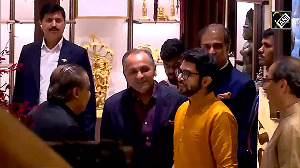December 2022 could be the last Christmas for Santha Bakery, a business drawing its lineage from the first Christmas cake baked in Kerala.
Will fortunes change, wonders Shyam G Menon.
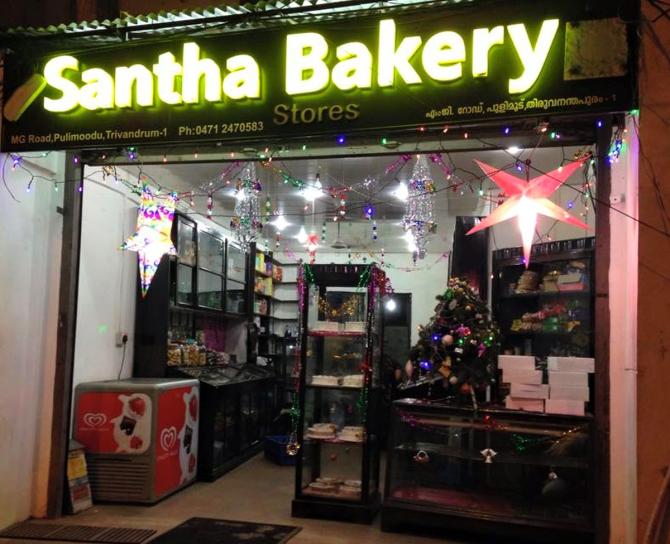
Come December and a much-loved Thiruvananthapuram bakery may sail into the sunset.
Not far from one of the main gates of the state secretariat is Santha Bakery, familiar to families in the city as a name recommended by parents and grandparents for good quality products.
The shop at Pulimoodu has stayed pretty much the way it was founded 82 years ago.
Tucked into one of the shelves is an illustration that depicts a scene from December 20, 1883.
The location is Thalassery (erstwhile Tellicherry) in Malabar.
In the backdrop is a shop called Mambally's Royal Biscuit Factory.
In the foreground is a Malayali gentleman -- Mambally Bapu, the owner of the shop -- handing over a cake to an Englishman identified as Murdoc Brown of Anjarakandy Estate (an estate by the name features on the Internet; it was commenced in 1767 and is today one of Asia's largest cinnamon estates).
The cake at the heart of the picture is claimed to be the first Christmas cake baked in Kerala.
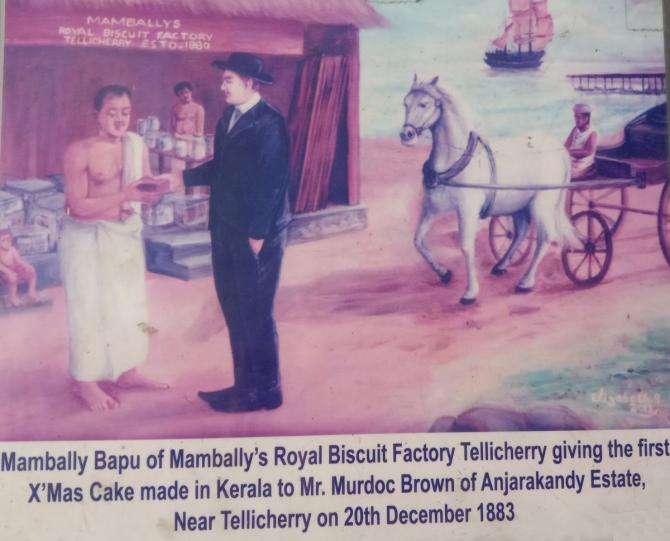
According to 66-year-old P K Premnath, who manages Santha Bakery now, Mambally Bapu worked in Myanmar (formerly Burma).
There he grasped the potential of baking. On return to Kerala, he started the Royal Biscuit Factory in 1880.
Three years later, Brown approached him with a British made-cake and asked if Bapu could bake a similar one.
Bapu was already making bread, bun and varieties of biscuits. He didn't have a mold for the cake.
He created one, found suitable ingredients and produced a local version of the classic plum cake. Impressed, Brown is said to have ordered a dozen.
While that kicked off the baking of Christmas cakes in Kerala, Premnath's connection was with a small boy positioned at the left edge of the illustration.
Named Gopalan, he was Premnath's grandfather and eventually (courtesy old Kerala's matrilineal system of succession) owner of the biscuit factory after Bapu's time.
In the years preceding the formation of Kerala state, Malabar was part of the Madras Presidency.
Longstanding commerce around spices had made the place important and opened it up to influence from elsewhere.
Places like Wayanad hosted plantations. It meant, an element of exposure to the life of foreigners and their way of life.
For example, Thalassery was among the places where that very English game -- cricket -- was first played in the subcontinent.
In the culinary arts, the European connection meant potential in Malabar for the practice of baking.
In the decades that followed, folks from Thalassery would play a significant role in popularising bakeries throughout Kerala. Gopalan's life reflected that journey.
Once the Royal Biscuit Factory began flourishing in Thalassery, members of the family started Modern Bakery at Mittayi Theruvu in Kozhikode.
Later, Cochin Bakery commenced at a location close to Ernakulam's boat jetty.
In 1940, following required permission obtained from the Travancore government, Santha Bakery (it was named after a member of the extended family who died young due to meningitis) started operations at Pulimoodu, very close to Statue Junction, in Thiruvananthapuram.
A couple of years later, Bestotel in Kottayam was begun by members of the Mambally family.
In the early 1970s, when I attended school in the city, the Statue-Pulimoodu stretch was already Thiruvananthapuram's nerve centre.
It was close to the seat of government -- the state secretariat.
Right opposite the bakery was the city's only Bata showroom and a restaurant called 'Simla' famous for its ice cream and fruit salads.
The main post office, a couple of book shops, a few shops selling sports goods, a couple of paint and hardware stores, a shop selling coffee, an outlet for home appliances and Santha's competitor, Queen's Bakery, completed Pulimoodu.
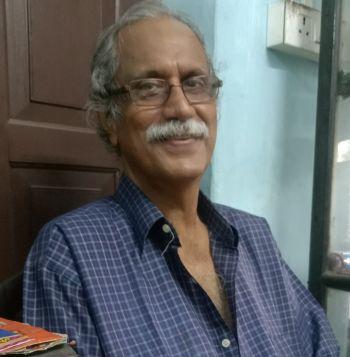 IMAGE: P K Premnath
IMAGE: P K PremnathIn 1940, the view from the bakery was different.
Across the shop was the yard where the city's horse-drawn carriages and their passengers assembled.
In due course, Gopalan asked P M Krishnan, Premnath's father, to join his brother-in-law, Kanari, in managing the Thiruvananthapuram bakery.
Krishnan had an interesting background. He worked for the Madras Presidency administration in the timber department as a timber passing inspector.
Krishnan would periodically come across violations by the companies involved. For a penalty, he made the companies build toilets for the public.
Krishnan, the timber passing inspector, had another side.
Communism had sprung roots in Malabar and Krishnan was an avid supporter of the Communists.
At his quarters in Valapattanam, he sheltered the likes of A K Gopalan and E M S Namboodiripad in the times when Communists were hunted by the authorities.
Consequently, when the administrators transferred Krishnan to Sri Lanka as part of his job, it was a case of crossroads.
If he went abroad, he would be without his familiar ecosystem. That's how he joined the management at Santha Bakery.
It helped him be in Kerala. As Kanari's health faded, Krishnan's role at the shop, grew.
In the years Krishnan was part of the team running Santha Bakery, the room behind the main shop hosted an oven fired by coconut shells and operated by workers brought from Thalassery.
Throughout the day, it churned out bread, cakes and biscuits in that order with the baking of bread done when the oven was at its hottest. "Just the aroma of baking was good enough advertisement for the shop," Premnath said.
He reserves much respect for the bakers of this coconut shell-fired era because unlike their present-day brethren used to readymade ingredients and automated ovens, they knew how to work back from a product defect and identify where in the process a step went wrong.
Baking was high craftsmanship. Once a cake made in the shape of the state secretariat won Santha Bakery a prize at a local exhibition.
Good craftsmanship is one thing. Getting the products accepted is another.
As mentioned earlier, Malabar was used to baking. Premnath has heard old stories of biscuits from the Royal Biscuit Factory sold at Thalassery's temple fairs and bread carried in baskets by salesmen for home delivery.
Down south in Thiruvananthapuram, a more traditional diet dominated and baked products like bread were typically taken when people fell ill, when they came down with a fever.
Slowly the situation changed. It gathered pace when the formation of Kerala and the emergence of Thiruvananthapuram as state capital saw northerners migrate to the south on work.
Their food habits required catering. It catalyzed the acceptance of bakery items locally.
Alongside this, an old accounting practice still done by many mom-and-pop stores in India helped bring the shop closer to its customers.
People were allowed to buy on credit and settle their outstanding when they got their monthly salary.
This is among the reasons why in the Thiruvananthapuram of yesteryears, families developed loyalty to select shops, among them bakeries of their choice.
Given its location, Santha Bakery's loyal customers typically came from the state secretariat, the nearby office of the Accountant General, the city's main post office and the banks lining the arterial M G Road.
Aside from people dashing across to pick up baked products when guests were expected at home, it became routine for customers to drop by at the bakery on their way home from work. Weekends were generally busy.
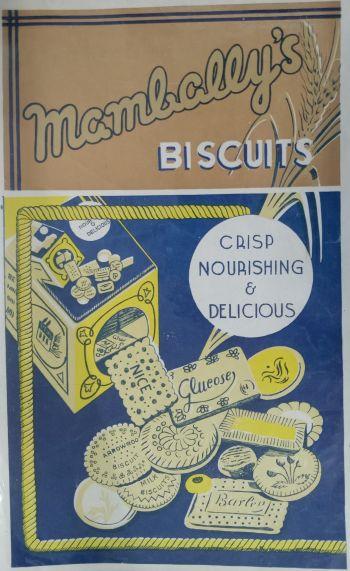
With a person like Krishnan at its helm, Santha Bakery was more than just a bakery.
Krishnan's friends from Communism (they would later become important figures in government) would drop by.
Premnath has preserved some old wooden stools because they were part of the seating arrangement for such impromptu gatherings.
Visitors to the shop included politicians like AKG, EMS and Krishna Pillai and film actors like Sathyan, Gemini Ganeshan and Shivaji Ganeshan.
Santha Bakery supplied cakes to Raj Bhavan when V V Giri was Kerala's governor.
Later when Giri became the President of India, his acquaintances in Thiruvananthapuram occasionally sent the cakes to Rashtrapati Bhavan in Delhi.
The bakery's presence doesn't end there. "My father was into three of the four Cs Thalassery is famous for -- cakes, Communism and cricket. Only circus was left out," Premnath said laughing.
Cricket was an obsession with the Mambally family.
In all, eight people from the family played for the state team.
Even circus, the one C they weren't associated with, made its link obliquely felt.
As a person from Malabar resident in Thiruvananthapuram, Krishnan was often contacted by circus teams visiting the city, for guidance in securing permissions from local authorities.
Krishnan also raised racing pigeons. His reputation in the sport was so strong that once a senior diplomat of the erstwhile Soviet Union came to meet him, Premnath said.
The house the family lived in, which was a short walk away from the bakery, was a part of the ecosystem frequented by the visitors.
Krishnan passed away in 1976. Premnath remembers that much of Pulimoodu shut down to pay its respects; even the Bata showroom, part of a company-managed retail chain.
A new generation -- Krishnan's children -- took charge at the bakery. One of them had studied baking in Pune.
The first doughnuts sold in Thiruvananthapuram happened as a result.
Premnath, recalled an incident from this period. Thiruvananthapuram is host to the Vikram Sarabhai Space Centre, part of the Indian Space Research Organisation.
A P J Abdul Kalam, who was then with ISRO, wanted a cake shaped like a rocket. The bakery delivered it.
Meanwhile, with Krishnan's children sharing the returns from the business, it was clear that the bakery's revenues had to be grown.
During Krishnan's time, a shop was acquired at Kumarapuram in the city to open a new branch but it never took off.
Under its new-generation owners, Santha Bakery started a second outlet at Vazhuthacaud in 1983.
In the late 1980s, a third one, functioning from a shopping complex near Kowdiar in the city, was added.
Those years were perhaps the height of its business in Thiruvananthapuram. Looking back, it may have however hidden a weakness -- institutional sales was small.
Good at studies and into cricket, Premnath wasn't originally meant to join the family's bakery business.
That changed with the demise of his father. Then his two brothers, Mohandas and Raghunath, passed away in 2004 and 2016.
By now, the market had transformed. Technology and automation gave baking an industrial scale.
Small family-run shops were being out-maneuvered by companies selling packaged products.
At the same time, ramping up capacity spelt greater capital cost.
The sort of model Santha Bakery had, focused on families with little institutional sales, came under pressure.
Queens Bakery in the neighbourhood, shut down. About five years ago, Santha Bakery's Kowdiar outlet was closed.
Further, a major problem loomed. Premnath does not have children.
From the children of his siblings, only one person showed interest in Santha Bakery.
For a while, those interested toyed with the idea of transforming the bakery into a sort of heritage establishment, which either sold only products that it made or sold products in an ambiance that leveraged the family's connection with cricket.
None of it worked out although Premnath believes that the future for bakeries like Santha is to become a heritage business.
"The love for carefully baked items and the old shop-client relationship will revive partly, as the impersonal industrial paradigm tires," Premnath said.
Perhaps so. But a business still requires new hands for continuity and there are no takers for Santha Bakery in the next generation of the Mambally family in Thiruvananthapuram.
The proverbial straw breaking the camel's back was probably COVID-19.
Trapped indoors during the pandemic, many people started baking at home using recipes from the Internet.
"Some of these bakers are really good," Premnath said, explaining how the craftsmanship that once protected businesses like Santha Bakery has become easily accessed knowledge, spawning in turn, new nimble enterprises with few overheads.
In October 2022, when I met Premnath, the Pulimoodu outlet of Santha Bakery appeared a candidate for shutdown. "I had thought of closing down after 84 years because that much time translates to a thousand full moons witnessed. But then a customer with whom I shared my idea pointed out that the lunar month has only 28 days and so, the 1000 full moons probably stood completed in 82 years," Premnath said.
December 2022 could be the "last Christmas" for Santha Bakery at Pulimoodu, a Thiruvananthapuram business drawing its lineage from the first Christmas cake baked in Kerala.
As Premnath visualises it, the Pulimoodu shop will shut first; Vazhuthacaud will follow suit at a later date.
Will fortunes change?
Christmas knows.
Shyam G Menon is a Mumbai-based columnist.
Feature Presentation: Rajesh Alva/Rediff.com








